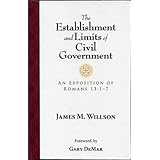
Book Review:
The Establishment and Limits of Civil Government: An Exposition of Romans 13:1-7
James M. Willson
The arguments of this book are:
The Establishment and Limits of Civil Government: An Exposition of Romans 13:1-7
James M. Willson
The arguments of this book are:
1. Civil government is not exempt from criticism
2. Romans 13 gives the basic criteria by which to judge civil gov'ts.
3. If it doesn't meet those criteria, we may not give our allegiance to that government. To accept its authority and give it our allegiance is ungodly.
4. Those criteria involve acknowledging Jesus Christ as Lord explicitly.
5. America (in 1857!) does not meet these criteria due to the institution of slavery. This doesn't mean we stop working for good and peace, though.
There are some interesting interpretations in the book. We must submit to excellent authorities, not to the governing authorities (Rom 13:1). Juicy ones like that were a tip off to me that the author is overly biased against submission to civil authority, or that current events were skewing a natural interpretation of the text against such submission.
Willson makes some good points. I basically agree with 1, 2 and 5 above. Also, our government should acknowledge the Triune, Christian God, and does not. And God does not call us to submit to and follow evil governments like those described in Revelation 13.
But the author concludes that we only give allegiance and submit in conscience if a country's policies are obedient. He rejects the position that we submit wherever we can, to any and all laws that do not require us to sin. But when he raises the obvious objection of how Daniel could be faithful in Babylon, he says it is because he wasn't required to take an oath against the truth. This position is not consistent. When he mentions that Nero was emperor when Paul wrote this, he simply responds that God could not have meant for the Romans to submit to the beast of Rome. This begs the question.
He also leaves unclear what it means to withhold allegiance but continue working for good. No military service? Voting? What? I would agree with him that Christians in present America (1857 or 2011) should be less wildly enthusiastic about the greatness of their nation, given all the immorality we produce, consume and export. But I don't think I need to refrain from reciting the pledge of allegiance, so long as that allegiance is subordinate to our first loyalty to Christ, the ruler of every nation.
Willson argues against the extreme of blindly submitting to any existing government, no matter its policy, simply because it is there, to which I am also opposed. In doing so he falls to the other extreme of requiring too high a standard before submitting to a government's authority. This is inviting anarchy, which objection he mentions only to casually dismiss, as he does the travesty of the French Revolution.
We should submit to our government in every area we can, to any and all laws, even unjust ones by which God judges us. At the same time, we should work vociferously for justice in our laws. If we are so concerned to not be tainted with sin in our nation, we will not be engaged enough with people to really change them for the better.
Two stars.
No comments:
Post a Comment